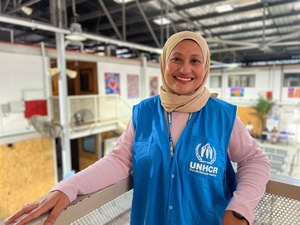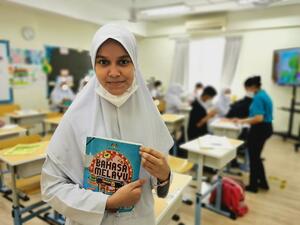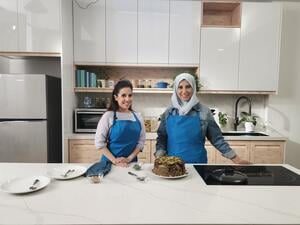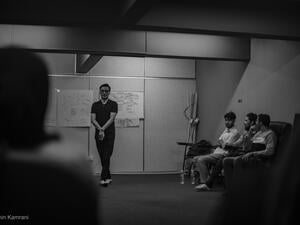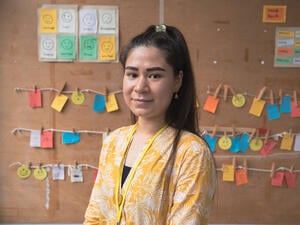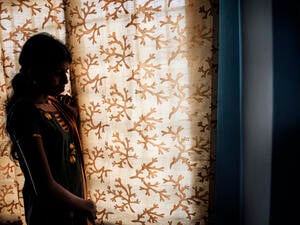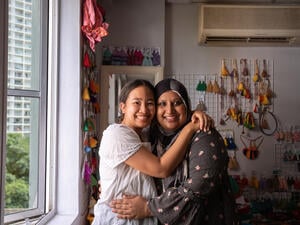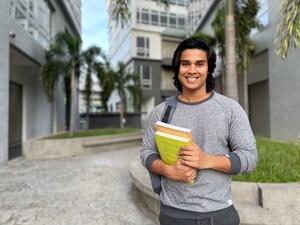A Conversation With a Volunteer

A Conversation With a Volunteer
Rose J Ngau is a Malaysian, and has been a volunteer with UNHCR, the UN Refugee Agency since 2014. She is a certified and trained Montessori Pre-School Teacher with a Diploma in International Montessori Pedagogy from London.
She is now a volunteer at the UNHCR office itself, but she began by volunteering at a refugee learning centre run by refugees themselves in Malaysia, teaching English to Primary 1 and 2 students several times a week.
Refugees have no access to the national education system, compelling UNHCR, its NGO partners, and refugee communities themselves to support a parallel system of education. There are now more than 120 community learning centres for refugees and asylum-seekers throughout Malaysia, many of which struggle with limited funding and overcrowded classrooms with few resources. Volunteers, like Rose, help support these learning centres through teaching children, training refugee teachers, and providing many other services.
There are currently over 200 active and committed volunteers registered with UNHCR who dedicate their time to helping refugees in a variety of programmes, including the education programme.
Interview by Izarra Azuddin, UNHCR Kuala Lumpur.
Why volunteer? And why volunteer with refugees?
Volunteering is not new to me. I was exposed to it at a young age by my late father. He volunteered his time and expertise at various local NGOs, churches, clubs, and associations doing community-based development projects, especially in the areas of education and public awareness.
But, the question as to “Why refugees?”? In the past, my quick, non-thinking response would simply be: Why not?
But on the hindsight, I actually do have a few reasons why – such as, that the opportunity to do so presented itself, and that, as a trained Montessori Pre-school teacher, I had the skills to contribute.
But also, because refugees are deemed by our laws as “illegals”, and as such, they do not have access to our public education systems. The Montessori philosophy advocates education for all, and I needed to do what I could to give refugee children that opportunity as well.
Education is very dear to my heart.
My late father inculcated within my siblings and I, the love of learning and acquisition of knowledge in all forms available - formal, informal, vocational, apprenticeship, latest technology. He was a firm believer that everyone especially the poor and marginalised must have access to free education, if not all the way to university, at least the primary and secondary levels.
And, was it hard in the beginning?
Well, even though I had been pre-warned about the refugee learning centres before I went, the conditions still shocked me. No tables, no chairs, no air-conditioning, no textbooks, small and crowded rooms, children sitting on the floor.
On that first day, I saw the students sitting on the floor, yet oblivious to the lack of furniture and heat in the room. I could see they were very eager to learn even in such an environment. Reality hit me. I suddenly realised that since birth, I have had easy access to items like tables, chairs, fans, air-conditioning and electrical appliances that I’ve taken for granted and may not appreciate them as much as these refugees.
In the first few days, I only observed the class and assisted the refugee teacher. I learned to know the children’s learning capabilities, their personalities, and group dynamics. As a result, not only was I able to devise appropriate lesson plans according to the students’ competencies, but most importantly the students and I were comfortable and used to each other when I eventually took over the class from the previous volunteer.
I also had to learn to adapt quickly and be flexible to the Head Teacher’s style of managing the learning centre. There is a teaching schedule, but this is just a guide and not rigidly followed. There were instances when I turned up at school ready with my lesson plan for my designated class only to be told that I was to teach a higher level class as the teacher was not coming that day. Impromptu improvisation in lesson plan.
As all teachers know, preparatory work goes a long way! How did you prepare?
Since I had no prior experience in teaching, I did a lot of research and read about challenges in teaching students in inner cities and developing countries to help me in teaching and managing my class.
My Montessori training challenges me to be resourceful and find solutions to the lack of teaching and learning resources, equipment, and furniture in the school. For example, a solution to the table and chair issue - I designated sitting spots to the students and made sure they sat and worked from their spots at all times except for group activities. By doing so, they at least have a space they could call their own, thus they have the freedom to learn from within a given boundary. Soon enough, they took ownership and became protective of it.
The community you volunteer with are refugees, with some very specific protection concerns or trauma due to what they have experienced. How did you navigate this?
Malaysia treats refugees as ‘illegals’. Hence, they are vulnerable to arrest by law enforcement officers. And young children, especially, are highly susceptible to crimes against children such as sexual offences and human trafficking.
As such, whenever I am at the school, I become more alert of my surroundings and watchful of strangers and non-familiar faces in the area. In addition, I constantly remind the Head Teacher to educate the children of their safety in and out of the school.
I did have to handle a special case last year. This student, a boy aged nine has always been an active, happy, participating member of the class. Has good leadership potential. One who would stop a fight rather than start one.
But towards the end of the year, I noticed he was starting small fights among the classmates and becoming aggressive, even towards the girls. He refused to say anything when I confronted him but his classmates told me that his grandmother (and sole guardian) had passed away. The Head Teacher confirmed that he was being taken care of the refugee community leaders because he had no other relative in the country.
With that knowledge, in the subsequent weeks, I instinctively switched to ‘mother’ mode for him and decided to make his time in my class as comfortable and secure as possible. I paid extra attention to him, making him class monitor so he could assist in giving out worksheets, made him in charge of cleaning the board to prevent him from bullying and fighting with his classmates as well to keep his mind from his grief. And yes, lots of hugs, jokes, and muffins helped. He stopped misbehaving a few weeks later.
Knowing the background of the children you teach, did you have to consider differences in your experiences or viewpoint of the world, as compared to theirs?
Inevitably, there is a gap in the socio-economic level of a refugee and that of a volunteer. A volunteer would have easy access to free education, free health and other public amenities, freedom to travel in and out of the country without fear, freedom of expression, access to employment opportunities, access to recreation and sports, entertainment, good food, freedom to the lifestyle of their choice.
Because these are things which refugees will encounter eventually, I try to introduce them in my lessons at appropriate times in the hope that these children will aspire and work hard to better themselves through education.
For example, I show many video clips of young children from different parts of the world going to school and interacting with their peers; we celebrate the different religious festivals of Malaysia by story-telling and showing video clips of how Malaysian children celebrate these festivals, we eat the special food served during the festivals; we learn children’s songs from different countries and listen to different languages; we do arts and crafts found in other countries, and taste food from different countries.
My students love sports, especially football, and famous artists. So I organise time for them to talk about their ‘idols’ so they can practise their English, and in return, I show video clips of the journeys these famous celebrities take to be successful.
Any personal lows or highs you could share?
No personal lows. Many personal highs.
Like when a student passes the yearly exams and graduates to the next level. Or seeing a seven year old girl in Pre-Primary class, with no previous knowledge of the alphabet, able to recognise letters, spell, and read words after only a few months in class.
I remember another case of an eight year old boy, who came to the centre only in the second half of 2016.
He was not aggressive but he was constantly restless and fidgeting, thus disrupting the class. He was unable to concentrate, so most of the time, could not finish his work. I devised special lessons for him to promote his concentration and countered his restlessness by engaging him as my assistant. He is still in my class but is now able to concentrate better, his restlessness has been channelled into active participation.
Do you feel like you have changed - for better or worse - because of this experience?
The children have taught me: courage, boldness, perseverance, tenacity, hope, and joy in the face of adversity. Virtues which I learned as a child too, but somehow, lost in the bustle of metropolitan living.
Volunteering with refugees has shown me that refugees are able to live with whatever they have. Being involved with them has made me notice the excesses of my life. They have inspired me to adopt a minimalist and ‘zero waste’ way of living.
And I realised that the world is really harsh to the poor, marginalised, uneducated, and powerless, children and women. I stopped being a bystander and decided to ease this ‘harshness’, even by a little, by volunteering and doing something with my talent and expertise.
On the most part, it has been greatly rewarding, although it can be draining and frustrating at times especially when my efforts do not seem to yield any visible results or improvement in the children. But I focus on being open minded and adopt an attitude of willing to learn, share and serve.
And do you think volunteers are critical in supporting refugee education?
The volunteers, be they Malaysians or expats, come from all walks of life, with different academic and professional backgrounds. Many have travelled the world. When they enter the refugee classrooms, they bring their wealth of life’s experiences and expertise with them. They do not become only teachers, they become the children’s mentor, parents, confidant, and biggest cheerleader. In other words, they are contributing toward the wholesome development of many young members of the global society.
Without volunteers, refugees in Malaysia may not be able to even have the basic level of education and acquire the necessary skills to sustain themselves in this country as they wait for long term solutions to their plight.
Do you think you will keep volunteering?
Education is a basic human right of every child in the world. It is also very close to my heart. I believe every child should have access to free education. With education, they can be equipped with the necessary knowledge and tools to be a contributing member of society.
Yes, I will keep doing this for as long as I can serve and support the refugee community.
In general, anyone with an interest in helping refugees is welcomed to apply to be a volunteer, and in general, you do not need specialised skills to volunteer. However, UNHCR also welcomes volunteers with specialized skills such as doctors, nurses and public health practitioners to apply. Volunteer lawyers, artists, photographers, writers, teachers, academicians and researchers, and events managers are also needed.
Email us at [email protected], or call 03 2118 4939, or visit the UNHCR website at www.unhcr.org.my to learn more.







